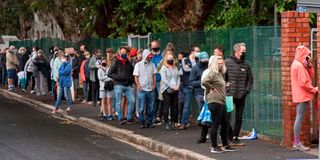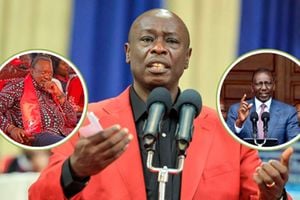SA municipal elections off to 'good start'

Voters queue to vote at a school being used as a polling station in the middle-class suburb of Claremont, near Cape Town, on November 1, 2021, during South Africa's local elections.
South Africans in their millions voted today for over 8,000 municipal posts in towns and cities across the country in a poll that may reshape the local governance political landscape.
The Independent Electoral Commission (IEC), which oversees voting procedures and personnel at over 23,000 polling stations, declared a "good start" to the voting, which was preceded by heightened political tensions, with several killings and incidents of intimidation.
The municipal elections – the fifth since the end of race-based rule in 1994 – are being seen as a test of the ruling African National Congress (ANC) party's continuing support against a backdrop of poor services, corruption and severe power outages.
Some 26 million eligible citizens are choosing representatives in SA's eight metros, 44 district councils and 205 local municipalities.
There are some 60,000 candidates from 235 registered parties or candidate collectives contesting the polls.
In KwaZulu-Natal, some 20 polling stations were affected by 'community action' from opening, many South Africans having become so disenchanted that they wished to prevent any voting at all.
New voter management systems
The IEC said that in those areas in the Zulu-dominated province, police had restored control and voting stations had opened.
In the Eastern Cape, 19 voting stations had opened late and in the Western Cape heavy rains also delayed the opening of some stations, especially in Cape Town and the surrounding region.
Overall, 99 percent of the 23,108 designated voting stations opened on time.
The IEC said it was "very happy" with its new voter management systems, which allowed it, at its lunchtime briefing, to say that over 3.5 million voters had already cast their ballots.
The IEC said one voting officer found stuffing marked ballots into a voting box had been arrested and another found to have opened a voting box after it had been sealed had been charged.
There had been other arrests, including of a local 24-hour TV news channel reporter covering the election at a polling station in Soweto, for which the IEC apologised, saying it had intervened to have the journalist released and was now investigating the circumstances of his arrest.
Beyond these, there had only been "isolated incidents" reported to it, the IEC said.
With almost 4,400 wards and an equal number of proportional vote seats to be allocated, there are literally thousands of relatively well-paying jobs on the line.
This fact, in an economy struggling with an over 44 percent total unemployment rate, has meant much pre-election contestation, including within ANC, leading to several political killings and heightened tensions.
Corruption
At one point, those loyal to former ANC leader Jacob Zuma and others in his faction of the ruling party, such as its suspended and corruption-accused secretary-general, wanted to promote a mass stay-away from the polls.
But that plan came to nothing and Zuma himself - still under house arrest after receiving medical parole on a 15-month contempt charge that had put him behind bars briefly - was out at his local voting station near his KwaZulu-Natal rural homestead of Nkandla.
The official opposition Democratic Alliance (DA), which runs the Western Cape province and most of the cities and towns in it, and the Economic Freedom Fighters (EFF) are looking to expand their representation at the cost of the ANC.
But political pollsters point out that recent surveys of likely voters had shown high levels of citizen dissatisfaction with all major parties.
Some likely voters said nothing would make them vote, indicating a significantly lower poll may be on the cards.
Also working against the established parties was a trend towards supporting independent candidates who were for the first time able to act as collectives in given municipalities and thereby enjoy the proportional vote received by individuals.
This election is considered by almost all election analysts to be among the most difficult to predict since the first all-race elections in 1994 due to the many particular factors affecting this Covid-impacted test of the voters' will.
In the last municipal elections of 2016, the ANC garnered 53.9 percent of the vote, the DA 26.9 percent, the EFF 8.2 percent and the Zulu traditionalists in the Inkatha Freedom Party 4.25 percent of votes cast.
In this poll, the ANC was expected to obtain around 49 percent of the votes based on survey responses of likely voters. If so, the ruling party will become for the first time in SA's democratic era a minority party by overall vote.
The ANC was expected to do reasonably well in its heartland areas but continue to lose power in towns and cities across the country where years of failures to repair potholes and provide electricity, fresh water, sanitation and refuse removal services had engendered up to 12 'service delivery protests' per day in the pre-Covid period.




